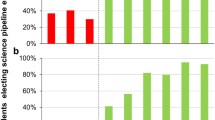Abstract
As I look back at K-12 science education in post-World War II America, it strikes me that surprisingly little progress has been made. This disappointing outcome cannot be due to a lack of effort, for in the last half-century our investment in science education reform—human and financial—has been substantial. In this essay, I focus first on some of our failures (as I see them) of the last 50 years, and speculate on why we were not more successful. With that in mind, I then propose a reform agenda for the next 50 years.
Similar content being viewed by others
References
American Association for the Advancement of Science (1989). Science for All Americans, Oxford University Press, New York.
American Association for the Advancement of Science (1993). Benchmarks for Science Literacy, Oxford University Press, New York.
American Association for the Advancement of Science. (1997). Resources for Science Literacy, Oxford University Press, New York.
American Association for the Advancement of Science (2000). Designs for Science Literacy, Oxford University Press, New York.
Cremin, L. (1990). Popular Education and its Discontents, Harper & Row, New York, NY.
Helgeson, S. L., Stake, R. E., Weiss, I. R., et al. (1978). The Status of Pre-College Science, Mathematics, and Social Studies Educational Practices in U.S. Schools: An Overview and Summaries of Three Studies, GPO, Washington, DC.
National Board for Professional Teaching Standards (1991). Toward High and Rigorous Standards for the Teaching Profession: Initial Policies and Perspectives of the National Board for Professional Teaching Standards, 3rd edition, NBPTS, Washington, DC.
National Commission on Excellence in Education (1983). A Nation at Risk: The Imperative for Education Reform, GPO, Washington, DC.
National Council for Teachers of Mathematics (1989). Principles and Standards for School Mathematics, NCTM, Reston, VA.
National Research Council (1996). National Science Education Standards, National Academy Press, Washington, DC.
National Science Foundation & the U.S. Department of Education (1980). Science & Engineering Education for the 1980s and Beyond, GPO, Washington, DC.
National Science Teachers Association (1992). NSTA Standards for Teacher Certification, NSTA, Washington, DC.
Rutherford, F. J., Holton, G., and Watson, F. G. (1970). Project Physics, Holt, Rinehart, and Winston, New York, NY.
Tyson-Bernstein, H. (1988). America's Textbook Fiasco: A Conspiracy of Good Intentions, Council for Basic Education, Washington, DC.
Author information
Authors and Affiliations
Corresponding author
Rights and permissions
About this article
Cite this article
Rutherford, F.J. The 2005 Paul F-Brandwein Lecture: Is Our Past Our Future? Thoughts on the Next 50 Years of Science Education Reform in the Light of Judgments on the Past 50 Years. J Sci Educ Technol 14, 367–386 (2005). https://doi.org/10.1007/s10956-005-8082-3
Issue Date:
DOI: https://doi.org/10.1007/s10956-005-8082-3




